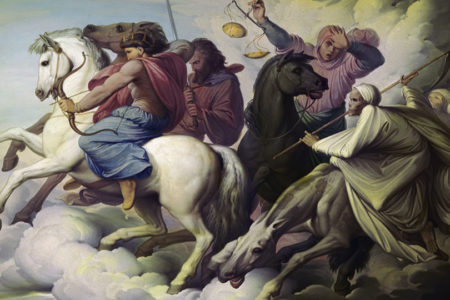Hannah and the God Who Hears Part One
Our greatest tragedies in life sometimes produce our greatest triumphs. And when our answer more clearly than ever and to use our sorrows to draw us infinitely closer to Him.
I know from firsthand experience. After my first husband died, it didn’t take me long to sink into a depression I thought I would never pull out of. Only my closest friends knew what I was going through; and though they reached out to me daily, the only one who could truly help me was God.
One day, as I sat in bed crying, feeling miserable and alone, I called out to Him in desperation and pain. And something wonderful happened. He lifted me from my pit and set my feet on a rock. He showed me, through His Word, that He heard all my prayers, saw all my tears, understood what I was going through, and loved me.
That was 22 years ago. And though I had given my life to Christ several years earlier, my encounter with Him that day, during my deepest despair, changed me and remains one of my sweetest memories in my walk with Him.
More than 3,000 years ago Hannah had an encounter with God. And through her pain and sorrow, He not only changed her but altered the entire course of Jewish history as well.
Hannah lived during the time of the judges, when the nation of Israel had no king and wallowed shamefully in sin, self-indulgence, and corruption. However, no matter how degenerate society becomes, God always has His faithful remnant. In those days, the remnant included Hannah.
She was a pious, godly Jewish woman who was in the unenviable position of having to share her husband with another wife. Most commentators believe Hannah was Elkanah’s first wife, but because she was barren he married another so he could have children. Wrote Alfred Edersheim, “The Mosaic Law tolerated and regulated [polygamy], but nowhere approved it, and in practice polygamy was chiefly confined to the wealthy.”1
Elkanah, in fact, probably was well off. When he made the 15-mile trip from his home in Ramathaim-zophim (usually called Ramah, 1 Sam. 1:19) to the Tabernacle in Shiloh, he was able to offer a bull—an expensive sacrifice (1 Sam. 1:25). According to Bible scholars C. F. Keil and Franz Delitzsch, the town even derived the latter portion of its name from Elkanah’s ancestor Zuph (1 Chr. 6:26, 35).2 His family apparently was prominent and had lived in Ramah for generations.
Elkanah was a Levite, a descendant of Levi’s son Kohath through Kohath’s son Izhar (1 Chr. 6:33–38). These Levites were not priests because they were not descendants of Aaron, also a Kohathite through Kohath’s son Amram (vv. 1–3). When the Israelites wandered in the wilderness for 40 years, the Kohathites carried the Tabernacle’s sacred furnishings (Num. 4:14–15). Later, under King David, some ministered in music (1 Chr. 6:32).
The mosaic Law required all Jewish men to appear before the Lord three times each year with their sacrifices. It was on these trips to Shiloh that Hannah’s wretchedness became most acute. Even Elkanah’s ardent love for her could not console her:
And whenever the time came for Elkanah to make an offering, he would give portions to Peninnah his wife and to all her sons and daughters. But to Hannah he would give a double portion, for he loved Hannah, although the Lᴏʀᴅ had closed her womb (1 Sam. 1:4–5).
Her misery was twofold: She was childless in a culture that venerated childbearing and considered barrenness a curse; and “her rival [Peninnah] also provoked her severely, to make her miserable, because the Lᴏʀᴅ had closed her womb” (v. 6).
By the time Hannah came to Shiloh in the account in First Samuel 1, she was so depressed no one could help her. She cried constantly, could not eat, and could not respond to her husband’s tender, sincere consolation: “Elkanah her husband said to her, ‘Hannah, why do you weep? Why do you not eat? And why is your heart grieved? Am I not better to you than ten sons?’” (v. 8). To prove his love, he even gave her a double portion of the sacrifice, enough for two people, “as if to indicate that he loved her just as if she had borne him a son.”3
But nothing helped. So Hannah went to the only one who could truly meet her need: the Lord. And in bitterness of soul, she poured her heart out to Him at the Tabernacle and promised that if He gave her a son, she would “give him to the Lᴏʀᴅ all the days of his life, and no razor shall come upon his head” (v. 11).
She is the first person in Scripture to use God’s name Jehovah Sabaoth, “Lᴏʀᴅ of Hosts” (v. 11). All Hannah had was the Law; the rest of the Bible had not been written. Her use of this name, particularly at a time when Israel was at war with the Philistines, shows she clearly understood that God is sovereign; all-powerful; and commands heaven’s armies, as well as Israel’s.
Eli the high priest observed her behavior as she prayed and thought she was drunk. But after she explained, he realized his mistake and told her, “‘Go in peace, and the God of Israel grant your petition which you have asked of Him’” (v. 17). Scripture says she went her way, “and her face was no longer sad” (v. 18).
God had spoken to Hannah through Eli. When she had reached her lowest point and needed Him desperately, He answered her. Hannah, whose name means “favor” or “grace,” found favor with God and bore a son whom she named Samuel, formed from two Hebrew words meaning “heard of God.”4
The Bible does not say how many years Hannah suffered before God finally answered. But during those years, He no doubt was molding Hannah into the person He wanted her to be.
God never wastes anything that He allows into our lives, particularly our suffering. He uses everything for our good and His glory to conform us to the image of His Son (Rom. 8:28–29). The same God who answered Hannah’s prayer also answered mine. He still answers today, inviting us, “‘Call to me, and I will answer you, and show you great and mighty things, which you do not know’” (Jer. 33:3).
But Hannah’s story does not end here.
ENDNOTES
- Alfred Edersheim, Bible History, Old Testament, Book 4: Israel Under Samuel, Saul, and David, to the Birth of Solomon (Peabody, MA: Hendrickson Publishers, 1995), 409 n. 7.
- F. Keil and F. Delitzsch, “The First Book of Samuel” in Commentary on the Old Testament in Ten Volumes (Grand Rapids: Eerdmans, n.d.), 2:16.
- Edersheim, 410.
- Keil and Delitzsch, 25.








Was looking for scripture where God’s favor was shown and Hannah, means Favor of God, so this was perfect